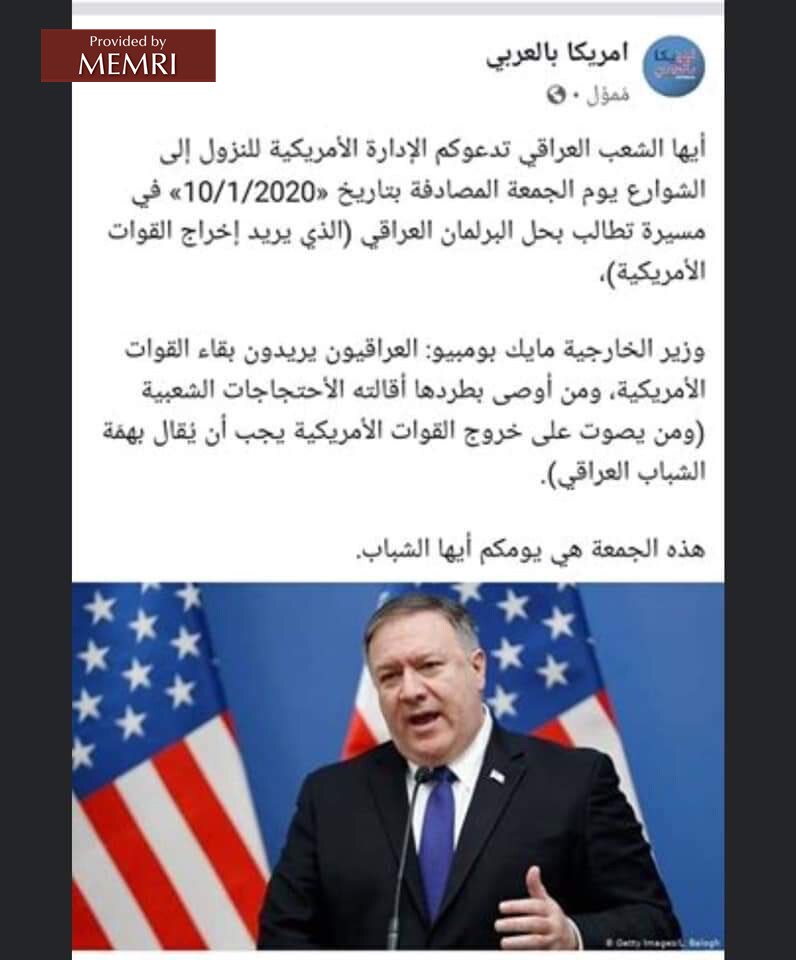In the aftermath of the U.S.-Iran escalation in Iraq, correspondents from the U.S.-funded Al-Hurra TV in Najaf and Baghdad announced on their social media accounts that they had submitted their resignations without providing reasons. Reports in Iraqi media have raised questions about the timing of these resignations, pointing out that the correspondents had been in their roles for over ten years and would therefore be unlikely to announce their resignations without giving an explanation.
Raji Naseer, the Al-Hurra correspondent in Najaf, and Mouafaq Majid, the Al-Hurra correspondent in Baghdad, publicized their resignations on their Facebook accounts, leading to reports that link the resignations to possible threats they may have received from Shi'ite militias that often accuse the network of bias and defamation.[1]

Mouafaq Majid's post on Facebook: "Thanks to my friend in Al-Hurra channel, I spent more than 10 years with you, I hope to see you in other chapters" (Source: Facebook.com)

Raji Naseer's post on Facebook: "I resigned officially from Al-Hurra Channel" (Source: Facebook.com)
This would not be the first time that employees of Al-Hurra TV have been threatened or acted against. In January 2019, Samer Ali Shakara, an Iraqi cameraman working for Al-Hurra, was found dead in a Baghdad suburb, having been shot in the head by unknown gunmen.[2]
In September 2019, Iraq's Communications and Media Commission (CMC) suspended the license of Al-Hurra TV and shut down its local offices for three months after it ran an investigative report highlighting corruption within the Sunni and Shi'ite Muslim endowments – state bodies that administer religious sites and real estate – including foundations linked to Iraq's top Shi'ite cleric Grand Ayatollah Ali Al-Sistani. It also said these religious bodies have ties to militias. Al-Hurra stood by their report in a statement, calling it "fair, balanced, and professional. And that individuals and institutions mentioned in the report were given the right of reply, which they declined."

"Al-Hurra Investigates," a report questioning the corruption in Iraqi religious institutions that aired in August 2019. (Source: YouTube.com)[3]
According to pro-Iran media outlets Naseer and Majid resigned in protest of the "biased narrative of the network."[4]
Over the past three months Iraqi authorities have been trying to avoid drawing publicity to anti-Iran protests, yet Al-Hurra has extensively covered these protests and the Iraqi government's heavy-handed response to them.
The resignations come amid a disinformation campaign launched by pro-Iran networks and supporters to discredit the ongoing protests in Iraq
Some pro-Iran media outlets have been uploading posters and videos on social media that incite violence against journalists and activists who cover the anti-Iran demonstrations.
Al-Anwar2, a satellite television channel, released a video[5] on January 9 accusing a group of popular Iraqi bloggers and journalists of being on the payroll of the U.S. Embassy in Baghdad, among them being an American national of Iraqi descent.
Fake accounts[6] claiming to be associated with the U.S. Department of State on Facebook are posting false statements attributed to U.S. Secretary of State Michael Pompeo claiming that he is calling on Iraqis to take to the street on January 10 "to reject the parliament's decision to expel the U.S. forces." The post below shows that money was paid to boost such posts in order to reach extended audience.

(Source: Facebook.com)





